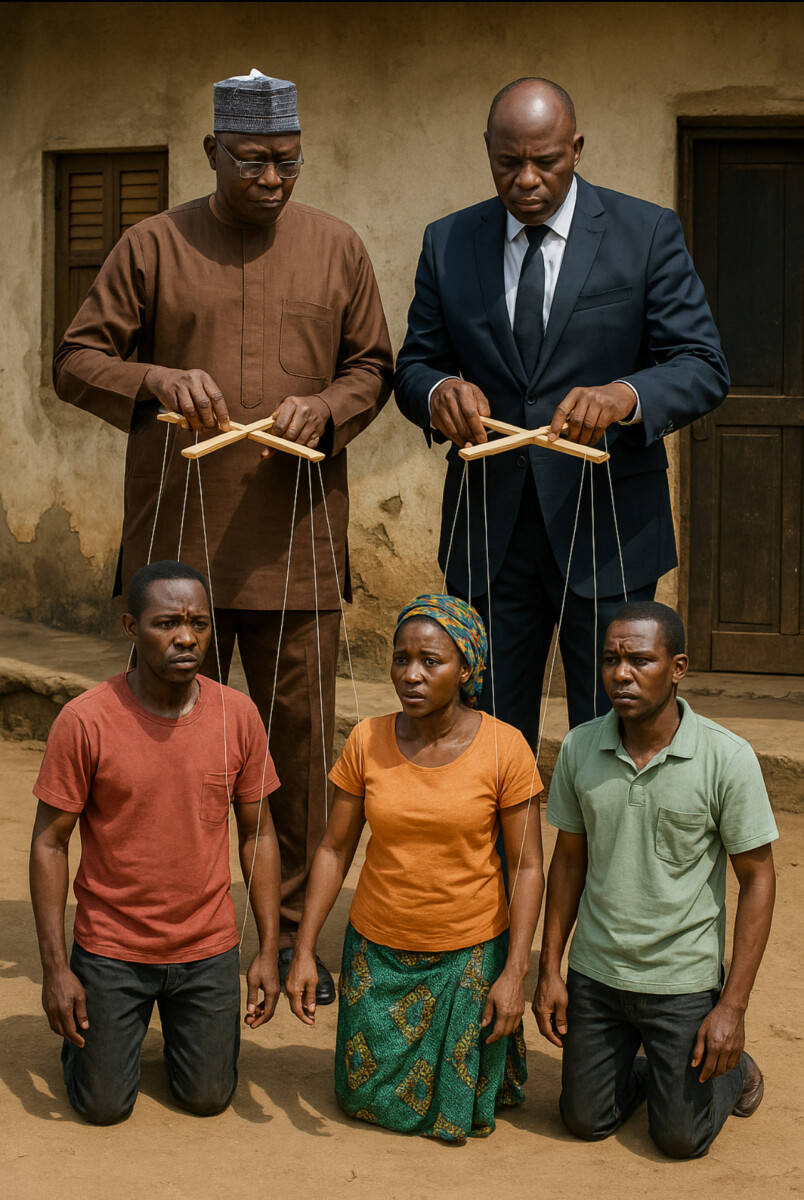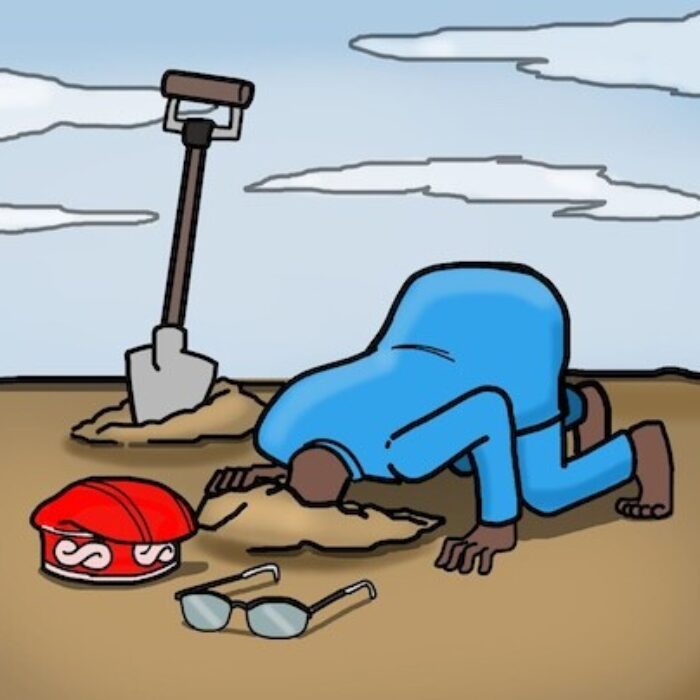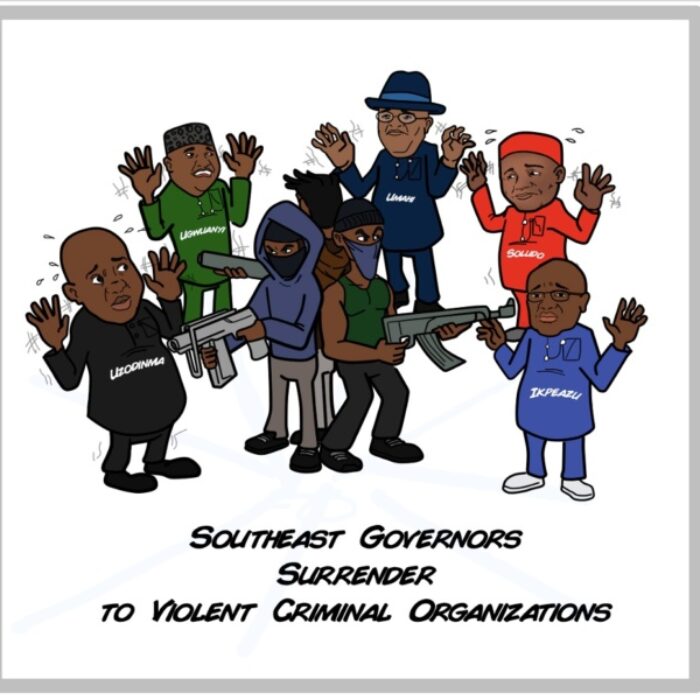By Nnaoke Ufere, PhD
As you already know, nothing truly works for millions of Nigerians across the country. Not the schools. Not the hospitals. Not the roads. Not the power supply. Not the courts. Not the police. Not the economy. Not jobs. Not security. Not food. Not drinking water. Not rent. Not cooking gas. Not hope. Not even prayer.
The majority of our citizens no longer live with purpose, they merely exist. Day after day, they navigate hardship, not out of strength or choice, but because the system leaves them no alternative. Shaped by decades of man-made suffering and dulled by its repetition, millions of impoverished Nigerians have become experts at pretending to cope, perfecting the tragic art of smiling while suffering.
We comfort ourselves with sayings like “God will provide” and wear resilience like a badge, as if resilience isn’t just a quiet surrender to abandonment and despair. We blame fate and accept the way things are as if they cannot be changed. But this is not faith. This is not patience. This is conditioned apathy, carefully cultivated over time to keep us silent, obedient, and broken.
We have learned to revere the very politicians who oppress us, like the abused who clings to silence because resistance only brings more pain. We no longer question our leaders. We worship them. We tremble before them. We fear Tinubu. We fear Akpabio. We fear Wike. We fear Ganduje and the APC, a party that has reduced governance to raw intimidation and turned the nation into a battlefield where only the ruthless thrive and the rest are left to beg, bow, or break.
We fear the DSS and police who should protect us, and the courts that should defend our rights. We fear the EFCC, not because we are corrupt, but because we know it can be used as a political weapon against anyone who speaks out. We fear the very institutions built to serve us, because over time they have been turned into tools of repression, not justice.
But perhaps more dangerously, we fear ourselves. We fear what might happen if we stand up, speak out, and demand more. So we retreat. We look away. We escape into social media, venting our justified anger as a form of release. Then we bury our heads in the sand and return to our broken, joyless lives, unchanged and unmoved. We didn’t get here in one year; this has been a long process of elite manipulation and political mind conditioning.
Over the past few years, as a researcher deeply immersed in Nigeria’s political system and social dynamics, I set out to understand how we ended up here and how recycled politicians continue to hold power in a country where nearly everything seems broken. I wasn’t just asking how they get away with abuse of power, corruption and failure, but why they do. Why do Nigerians, so often betrayed, remain largely passive?
What I found was both revealing and disturbing: a consistent pattern of behaviors repeated across tribes, religions, regions, and social classes. These are not random. They are learned responses, conditioned over time through manipulation, deprivation, fear, propaganda, and reward. This list of 36 ugly truths is the product of fieldwork, interviews, behavioral analysis, and historical reflection.
This is not a judgment on Nigerians, but a mirror I hold up to reflect how decades of manipulation and systemic failure have reshaped our sense of what is normal, acceptable, and even possible. These are the psychological levers that Nigerian politicians have mastered and continue to exploit to keep us compliant, distracted, and trapped in a cycle of low expectations and mere existence.
If we are serious about reclaiming democracy in 2027 and beyond, if we truly want to free ourselves from the grip of a ruthless ruling elite, and if we care about the future of our children and the legacy we leave behind, then we must confront these truths honestly and without flinching. And we must begin by changing our own behavior.
This article lays bare the 36 ugly truths Nigerian politicians use to keep us passive and subdued. If you recognize yourself in these truths, that’s the point. We all helped build this cage. Now it’s time to break the bars and reclaim our voice, our dignity, and our future.
These truths are not abstract theories. They are lived realities, deeply embedded in our everyday existence. They reveal how power is maintained, how apathy is manufactured, and how fear is weaponized against us by those who govern Nigeria.
These are the patterns of behavior politicians recognize and exploit to keep us subdued and maintain their grip on power:
1. They know we live in fear of being killed by them. We are more afraid to speak out than to endure the suffering they force on us every day. They know we’ve been broken into silence, beaten down until we became timid and submissive. We swallow injustice because we fear the consequences of resistance. So they count on our fear to keep us in check, and far too often, we prove them right.
2. They know we all have a price tag hanging from our necks. Even the most educated among us can be bought, just like the poorest street hawker. A degree doesn’t protect us from desperation; it only raises the asking price. So they keep buying loyalty across all levels of society, knowing that integrity is scarce and everything, including conscience, is for sale.
3. They know we growl and bark with fury on social media but fall silent when oppression stares us in the face. In public, we lower our heads and wag our tails like loyal lapdogs, too wounded and too weary to fight back. So they let us vent online, knowing our outrage rarely leaves the screen and never threatens their grip on power.
4. They know we are like Kakapos—many in number, loud in noise, but grounded and powerless. So they let us shout, tweet, and complain, knowing that all the noise will fade without action, and nothing will change.
5. They know how easily tribal and religious lines divide us. So they feed us this toxic brew every time tensions rise, stoking old wounds and deepening mistrust. So they play the poisonous identity card again and again because it never fails. It distracts us from our common pain, turns us against one another, and allows them to tighten their grip on power.
6. They know we will turn on each other and exhaust ourselves long before we ever gather the courage to confront them. They know we’ve been taught to hate one another, and they rely on that hatred to keep us divided, distracted, and powerless. So they stoke old wounds and deepen divisions, knowing that as long as we fight ourselves, we’ll never fight them.
7. They know we become willing tools during elections, easily manipulated and misled into acting as foot soldiers to help them rig the process. So they keep weaponizing poverty, misinformation, and ethnic and religious divisions, knowing we will fight their battles while they share the spoils.
8. They know our votes come cheap, often exchanged for a bag of rice, a few thousand naira, or empty promises that disappear the moment the ballots are counted or rigged. So they keep buying loyalty instead of earning it, confident that poverty will always be more persuasive than policy.
9. They know hunger makes us easy to buy. So they use poverty as an instrument of control, keeping basic needs just out of reach so we are too busy surviving to demand better. When people are desperate for food, shelter, or medicine, they become easier to manipulate, easier to silence, and easier to trade their power for momentary relief.
10. They know we trade eight years of power for a one-day handout. In that moment of desperation, we don’t just sell our vote; we give away our voice, our future, and any hope for real change. So they keep us hungry, knowing that hunger is the most effective voter suppression tool.
11. They know we are easily swayed by empty slogans and hollow symbols. So they dazzle us with grand promises like “Renewed Hope,” wave brooms in the air as if that alone can sweep away decades of failure, and flood the airwaves with choreographed rallies, borrowed crowds, and rehearsed speeches. Our memory is short, and our standards are low.
12. They know we won’t protest, not meaningfully, not persistently, not in numbers that matter. They know we stay silent even when we are choking, using silence as a shield against fear. We are afraid of dying, so we choose to endure. So they keep tightening the noose, certain that our fear will always be stronger than our outrage.
13. They know we bury our pain deep, hiding our anger, shame, and despair in the shadows of our wounded souls. So they keep inflicting more, confident that we will internalize the hurt, suffer in silence, and never fight back.
14. They know we still call them “leaders,” “president,” and “senators” even as they plunder our commonwealth, and we thank them for the crumbs they leave behind. So they keep stealing, certain that our titles and praise will shield them from outrage and accountability.
15. They know we have learned to be invisible, quiet, obedient, and small in the country we were meant to own. So they continue to shrink our space, silence our voices, and deny us agency, confident that we will not resist, will not speak out, and will not fight back. They thrive on our silence because it is the silence of surrender.
16. They know we celebrate the return of electricity for 20 minutes after days of blackout, as if a miracle occurred. Our memory is short, our outrage is shallow, and our expectations have sunk so low that even the bare minimum feels like progress. So they normalize failure, confident that a flicker of light is enough to blind us to years of darkness.
17. They know we treat a one-kilometer road, completed after 20 years and three governors, like the Great Wall of China. We praise failure, celebrate the bare minimum, and mistake long-overdue duties for gifts. So they give us less and expect more thanks, knowing we will applaud what should be demanded.
18. They know we feel grateful when one month of pension is paid after five years of neglect. We treat it like a favor, not a right, and celebrate crumbs as blessings. So they keep withholding what is ours, knowing our desperation will silence our demands.
19. They know we say “journey mercies” not out of ritual, but because surviving Nigeria’s roads and insecurity is a genuine miracle. So they ignore the carnage, abandon infrastructure, and allow insecurity to fester, knowing we’ve accepted danger as part of daily life.
20. They know we laugh through hunger and turn pain into songs and comedy, not because life is sweet, but because we’ve been taught to wear suffering proudly. So they keep deepening our hardship, knowing we’ll dance through the misery instead of rising up against it.
21. They know we now see government dysfunction as normal, accepted, and mediocrity as excellence. Expectations have been crushed so completely that basic services like electricity for a few hours or a hospital without dead bodies in the corridor feel like progress. We no longer demand competence. And in that lowered standard, they thrive. So they keep doing the bare minimum, knowing it will be celebrated like a national achievement.
22. They know religion is our drug of choice. The more they feed it to us, the more numb and passive we become. While we pray for miracles, they plunder the nation without resistance. So they keep funding crusades, building mosques and churches, and posing for photo ops with clerics because they know faith keeps us passive.
23. They know we’ve become our own government: providing electricity, digging boreholes, fixing roads, building schools and clinics, even hiring vigilantes for protection. We fund it all from our own pockets and proudly call it resilience. So they keep looting and abandoning projects, confident that we will step in, cover the costs, and carry on without protest, without demands, without holding anyone accountable.
24. They know we no longer believe justice is possible, so we shrug off every act of injustice and impunity as just another day in Nigeria. They know we see courtrooms not as places of truth, but as theaters where the highest bidder wins. So they continue to manipulate the law, buy judgments, and reward loyal judges while punishing those who refuse to play along.
25. They know we’ve accepted mass unemployment and high inflation as the new normal. So they make no serious efforts to create jobs or lower the cost of living, only meager handouts.
26. They know we have the battered woman syndrome, the tendency to keep returning to the same abusers, hoping they will change. No matter how many times they fail us, lie to us, or harm us, we convince ourselves that next time will be different. We cling to false hope, normalize the abuse, and call it resilience. So they count on that loyalty born of trauma to keep us trapped.
27. They know we are a people of low expectations, so even the barest minimum is celebrated like a grand achievement. So they do the least, make the most noise about it, and count on our applause to drown out their failure.
28. They know we no longer believe change is possible, so we disengage, laugh off politics, and say “Na so Nigeria be,” as if nothing better can ever exist. So they keep the system broken, knowing our hopelessness is their strongest armor.
29. They know we fear losing our jobs more than losing our dignity. They pay us meager wages that can’t even cover rent, yet we cling to those jobs and stay loyal to failure because survival feels safer than resistance. So they exploit our desperation, knowing we will defend the very system that keeps us trapped.
30. They know we glorify struggle, turning survival stories into badges of honor instead of signs of a broken system. We admire those who suffer and endure, rather than question why they had to. So they keep us struggling, knowing we’ll wear our pain with pride instead of demanding reform and a life of dignity.
31. They know we have an extraordinary tolerance for abuse, so they keep pushing the limits of cruelty, confident we’ll adapt without protest. So they escalate the suffering, knowing we will normalize it and carry on as if nothing is wrong.
32. They know we’ve given up on fixing the country. Now, we just want to grab what we can and get out before everything falls apart. So they deepen the rot, make the system even more corrupt, knowing we’re too busy looking for our own exit to demand real change.
33. They know they can defect from the very party and manifesto we elected them on, without any regard for the people’s mandate, accountability, or ideological consistency. So they treat our votes as personal assets, not as a public trust, switching allegiances whenever it suits their ambition, knowing we will grumble, then move on, without consequence.
34. They know we accept broken schools and failing hospitals while their children study abroad and they fly overseas for medical care. We endure the neglect in silence, as if quality education and healthcare are privileges, not rights. So they keep draining public funds for private comfort, knowing we’ll never hold them accountable for abandoning what should belong to all of us.
35. They know we are painfully aware that they sponsor the terrorists, insurgents, and unknown gunmen who kill and maim us. And they know we are too powerless, too afraid, or too disillusioned to stop them. So they keep fueling the violence, knowing we will live in fear, turn on each other, and never dare to confront the real enemy.
36. In the end, they know they have conditioned us, and that conditioning runs deep. It is why Tinubu, through his fixer Abdullahi Ganduje and mouthpiece Bayo Onanuga, feels no shame in mocking our suffering. We have been trained to see silence as loyalty, to believe that complaining is ungrateful, and that demanding better is naive. So they insult us openly, knowing we will defend them, stay quiet, or move on, just as we have been taught.
But what they do not know yet is that this knowledge can be our weapon. If we understand how they exploit us, we can begin to unlearn our behavior and apathy, reconnect with our collective power, and rewrite the future they believe is already theirs.
Therefore, my fellow Nigerians, I call on all of us to wake up from this long, engineered sleep. For decades, our politicians have studied us, manipulated us, and conditioned us to obey without question, to endure without protest, and to surrender power without resistance. They have exploited 36 deep-rooted behaviors, habits of silence, fear, tribalism, desperation, and learned helplessness, to keep us divided, distracted, and easily controlled.
But it does not have to stay this way. We can unlearn what they have taught us. We can break the cycle of apathy and reclaim our voice, our dignity, and our democracy. Change begins with each of us when we refuse to be bought, when we question instead of worship, when we prioritize truth over tribe, and when we dare to hold power accountable.
The future will not fix itself. We must fix it. Together. Not tomorrow. Now.




